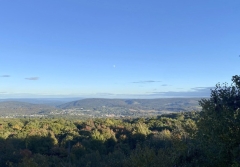Knauss legislative fellowships in Congress help build careers — and they're fun and educational. See our video and fact sheet for details.
The Maryland Sea Grant Bookstore will be closed for the winter holidays from Monday, December 15th to Friday, January 2nd and will not be taking orders during that time.
Moving to Frostburg: A new chapter in Western Maryland
The next logical step for me after obtaining my bachelor’s degree was graduate school, the pinnacle of my education. I hope graduate school will allow me to further specialize within the broad field of environmental science and refine technical laboratory skills. Preparation for graduate school included housing and moving logistics, choosing classes for the first semester, and reading scientific articles to give me enough background information to begin to understand my thesis research. However, there were still all the emotions and worries associated with change and moving to a new place. I resolved to view change in a positive light and applied an idea I had heard to my situation: Nature thrives on the consistency of change.
Growing up in the Northeast, the move to Frostburg, Maryland, was daunting since it is the longest distance and length of time spent away from my family. Before starting my position as a graduate research assistant, I had only been to Maryland once, for my first visit to the Appalachian Lab. When visiting, I immediately felt a sense of support from the community at the lab.
My first few weeks at the lab were overwhelming with information-packed orientations, the beginning of classes, and learning lab work. Despite the stressful start to the semester, I felt extremely lucky to have joined this new community. Faculty and students reached out to me and the other new students to offer their advice. I knew that the tight-knit group at the Appalachian Lab was incredibly unique, and there were so many new opportunities at my fingertips.

In addition to the kindness of the people in this town, I found a connection with my new environment that made me feel at home. I found myself yearning to spend time outside exploring the area. Frostburg was not the sleepy town I was expecting it to be. Instead, I was surrounded with the blue hues of the Appalachian Mountains in the distance, a plethora of hiking trails, and unique landscapes. I was able to find sanctuary in being outside, a space with numerous distractions that allowed me to destress or clear my head from a busy day.
Graduate school and my stay in Frostburg had always felt to me as time spent in a temporary location necessary to complete my degree. No longer just a stepping stone to a long-term career, this small mountain town is already beginning to feel like home.
When I returned to my parents’ house in Hampstead, New Hampshire, for the holidays and saw my family after three months, everyone had the same questions to ask: “How do you like Frostburg?” “Did you enjoy your classes?” “How is research going?” I replied unwaveringly and honestly, “Yes, I like Frostburg, my classes, and research,” and did not have to fabricate a word. This was a small victory, since the act of moving so far to pursue a master’s degree in such a niche topic seemed so foreign and uncomfortable to me a year ago.
No matter where you are physically, familiarity can be found in the most unexpected places and bring you comfort. However, with all significant transitions that occur in life, I did not find this sense of security immediately. It required patience. Ultimately, I would give the following advice to undergraduates pursuing graduate research: It is not the location or reputation of a certain school that makes a great opportunity. It is what you make of it and the people you meet along the way that will make your experience meaningful.
Top Left Image: View of Frostburg from a hike up St. John’s trail. Photo, Grace O'Hara
See all posts to the Fellowship Experiences blog



